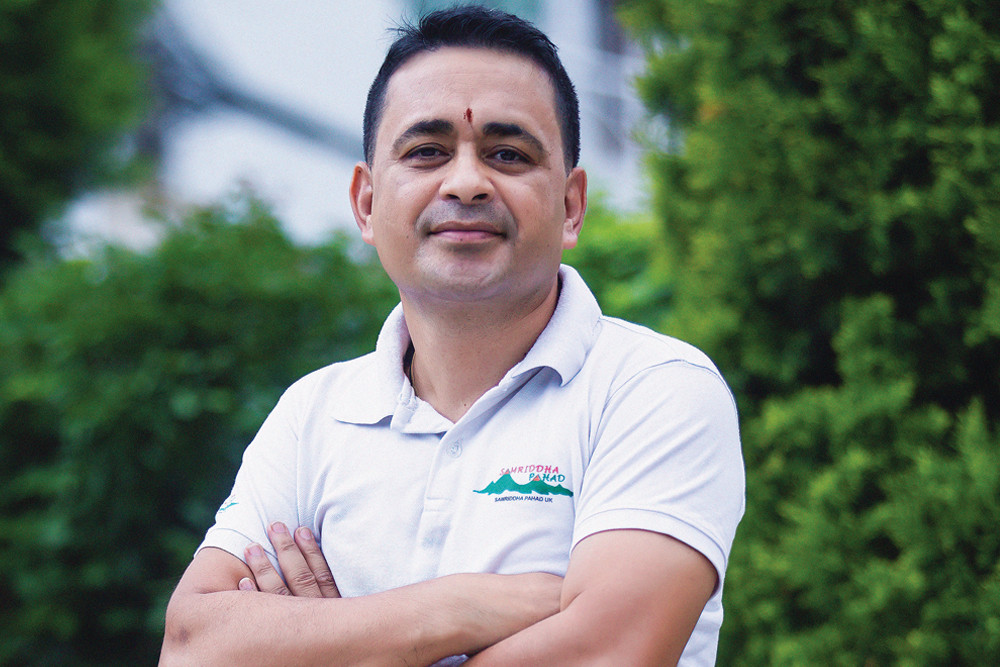
Ramyata Limbu
Festival Director
Kathmandu International Mountain Film Festival (KIMFF)
Ramyata Limbu is a journalist, filmmaker, festival director and member of KOC. In her own words, she is a media practitioner. She has 14 years of experience as a journalist and correspondent for various national and international publications starting her career in 1991 which included a stint with Al Jazeera.
Limbu co-produced and shot the independent documentary, ‘Daughters of Everest’, which followed the first ever team of women Sherpas to ascend Everest and ‘The Sari Soldiers’ which follows the story of six Nepali women on the forefront of the Maoist conflict in Nepal.
Currently, she is the Festival Director of KIMFF, Nepal’s premier film festival that recently celebrated its 17th edition.
Avant Shrestha caught up with Limbu to pick her mind on the topic of leadership, her profession and the future of the Nepali film industry.
What is your definition of leadership?
I think a good leader has to be someone who can be a role model. A person who practices what s/he preaches and leads by example. And finally a leader also has to be a team player.
I think when it comes to leaders in Nepal, they are generally envisioned as this big male figure or a person with masculine traits. Today, I believe that is not the case and it is changing. In fact, I think a good leader should have the traits I’ve mentioned and more.
Plus, I think it is very important to be able to listen and communicate well and bring people together to grow together and work as a team. Well, basically, that is leadership for me; a balanced mixture of all these qualities would make a good leader.
As a journalist and festival director what kind of leadership challenges do you face?
I think, basically, whether you are running a film festival or writing a journalistic story or organising a workshop or working in the media in general, I think you have to be very flexible. Like we say, you have to hit the ground running. As you work, you have to be able to deal with issues. You have to be on your toes, in fact, you have to think on your feet. I think that is an important trait to speak of.
Mainly, of course, it’s all about the preparation and research, which I think is severely lacking in Nepal. Not just in the media; it’s in every sector. So I think if we prepare better and research better, be it organising a film festival or working for a newspaper or starting a business or just carrying out a simple project, preparedness shall insure the positive work outcome.
Plus, as a producer you are thrown into situations, where things are never predictable. Issues just pop up. Things never go according to schedule and situations just change. It could be the weather, people, the protagonist, etc; there are just so many things. So you are always thinking on your feet and just basically hit the ground running and be flexible enough to adapt to the situation, deal with it and continue working.
Could you tell us a about ‘Daughters of Everest’?
In 2000, Lakpa Sherpa voiced a dream of climbing Mount Everest. She approached Sujata Koirala, our then Prime Minister Girja Prasad Koirala’s daughter, who was running Sushma Koirala Trust Fund. Lakpa approached Sujata Koirala with a pitch to fund a national expedition undertaken by a team of Sherpa women to climb Mount Everest.
I was associated with a newspaper when I heard about this. The news was groundbreaking and I knew I wanted to cover this. I approached my friend in the States who was a broadcast journalist and she agreed to join me. But we did not have any funds and had limited contacts. So we borrowed cameras, raised funds by borrowing from family, and we tagged along with the team.
We were there for the entire April season and we basically followed the team in the expedition. We started that documentary in 2000 but we finished in 2004. Over all, we were fortunate enough to be there. The film won a couple of awards and the woman who ascended the top, today, she holds the record for the most number of climbs by a woman.

Your leadership role model
I do not have anyone in particular as a role model. For me, personally, more than a role model, it could be a teacher, a filmmaker, a friend, or a family member who can teach me life’s lessons. For me, I think it’s just important to take or acknowledge a person’s positive personality. It could be anyone who could add value to your life.
How important is communication for a leader?
I think communication is something very important. You have to be able to communicate with the entire team properly. No matter where you work, whether in NGO, in a film festival, movies, business or a simple project with friends, if you don’t have a good communication plan and communication skills, taking anything forward will be very difficult.
A good communication plan is also very important. Through a communication plan, if everyone is well-informed then you can delegate your work smoothly. For example, during production, we brief and debrief every day. At the start of the day, we usually have a briefing session wherein we go over the day’s plans, our tasks and goals. At the end of the day, we debrief, go through our day’s work, and discuss the problems if there was any and how to make up for that, and also plan for the next day. It’s simple stuff like this but I think it’s very helpful.
Lastly, it’s just keeping everyone in the loop and constant conversation with the team. Plus, we have social media, messaging apps and access to the technology that definitely makes work easier.
What are the possibilities for our film industry to compete interntaionally?
I think it is possible. Today, we kind of talk about the great works being done in Korean cinema and Iranian cinema but I think it is attributed to the support their government gives them. The Korean and Iranian governments have started to invest and shown genuine interest in their respective film industries.
For example, Busan Film Festival is regarded as the premier film festival in Asia. That didn’t just happen. It happened because the Korean government invested to promote Korean cinema, to help the industry, to help them compete in the international spectrum and send their products out.
So, I think this is possible for the Nepali Film industry as well but we have to realise it is not only up to the private sector. We need support from the government and the Film Development Board’s support is crucial in order for the industry to grow. Just a few stakeholders attempting to change it every now and then will not make a large impact. Filmmakers, private sector and government should work together to help grow this industry.
What advice would you give to the filmmakers?
At KIMFF, I’ve observed that not everyone appreciates all kinds of films. You know audience is diverse and they all have different interests and different perceptions. For our festival, our one objective and responsibility is that we have to cultivate a diverse range of audience. We do not want to show films that everyone appreciates.
I think it’s important also to cultivate an audience by showing a diversity of cinema. I guess that’s how different perceptions will be created and filmmakers can gain different insights and work on their crafts. I mean, if you want to write a good book become a good writer, you have to read a lot, so if you want to make a good film, or improve your craft then you have to watch a lot of films, be familiar with the global cinema and the global market.
But filmmakers are not putting enough effort into their craft. The homework, the research and the film appreciation is lacking. I think many young filmmakers are condemned to sacrifice their creativity for commercial gain, so I encourage you to stick to your storytelling.
What’s the future of the film industry in Nepal?
I am an optimist. I always say that the glass is half-full. I think there is opportunity everywhere. It’s only the matter of how you grab that opportunity and how you take it forward. We have that space, but we shouldn’t just stay in our own compartments and work alone. In fact, we should join together and work; the government, the private sector and the artists.
I think film industry will experience a gradual positive growth. I don’t think we will ever be able to compete with Bollywood or Hollywood, given our size. Instead of aspiring to be say Hollywood, we have to realise what ‘Nepali film’ is and what we can offer. ‘What is our identity?’ Or ‘What kind of image do you get when you mention Nepali cinema?’ If we can identify that, I think there is a future for us in this huge large entertainment landscape.
What is the future for KIMFF?
As for the future of KIMFF, anywhere in Nepal, running a cultural program is difficult as it is an intangible aspect. Running a film festival isn’t easy. You need resources and you cannot just tell people we are going to show a film and call it a film festival. There has to be a motive behind it. The film festival is basically to explore, educate, entertain and expose people to ideas, to stories and to possibilities. Basically, getting them around to think and open up their minds.
So we are still running the festival. The recently held KIMFF was our 17th edition. We will continue. But what started off as a Mountain Film Festival basically focusing on mountain issues, culture, sports and stories about people; today this platform is regarded by many as Nepal’s premiere film festival. Now the point for KIMFF has come to whether we would want to stick to the theme of mountain and promote mountain films or we want to be bigger and include different kinds of programming. Lastly, I encourage the younger generation to step up and possibly take over the festival and continue it.


.jpg)


.jpg)